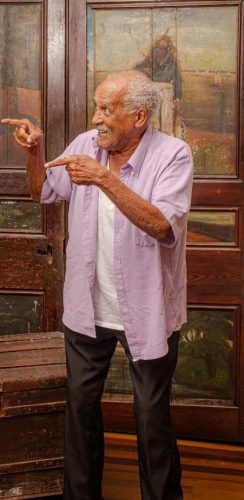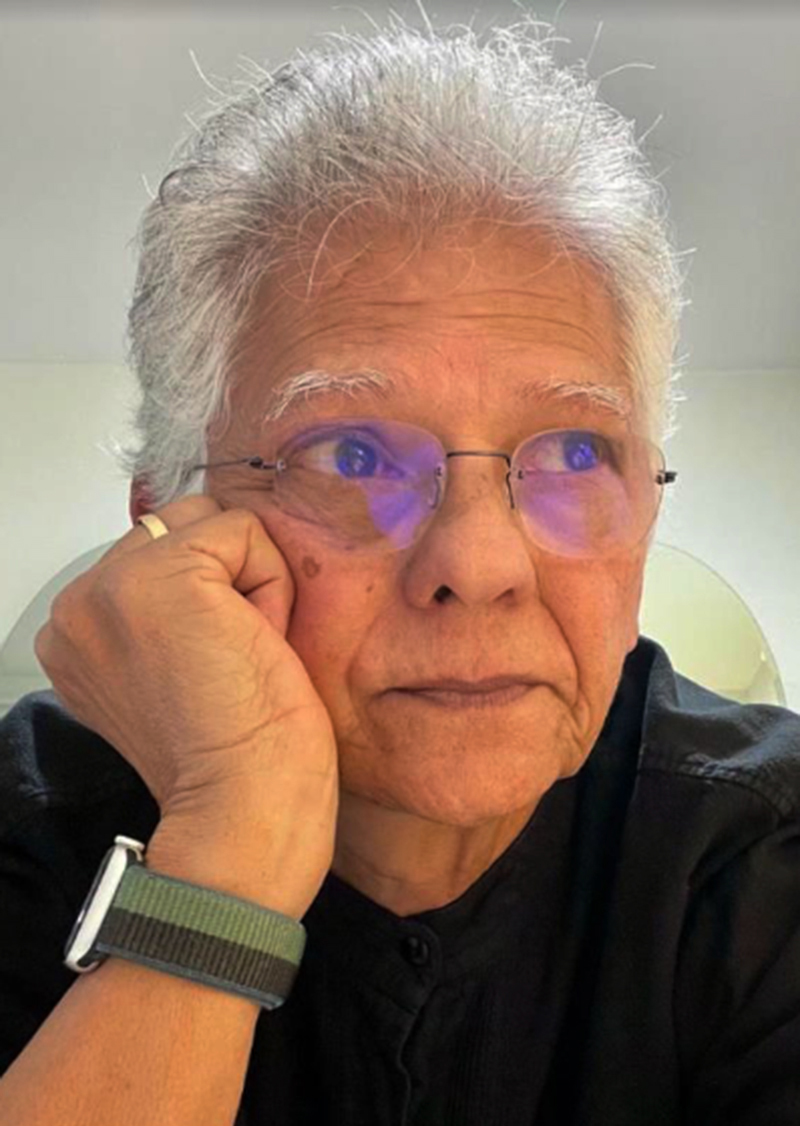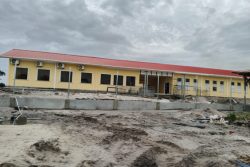 Our review of the year 2023 concludes with theatre, more specifically, an analysis of the dramatic plays performed during the year and recognition of the best achievements and performances. An overall assessment finds that it was the best year since COVID; the most plays performed after quite a few years and a significant count of theatrical achievements; the best year for payments earned by practitioners; a very good year for government recognition and support, but one in which such support still fell short of making dramatic production sustainable and of enabling producers.
Our review of the year 2023 concludes with theatre, more specifically, an analysis of the dramatic plays performed during the year and recognition of the best achievements and performances. An overall assessment finds that it was the best year since COVID; the most plays performed after quite a few years and a significant count of theatrical achievements; the best year for payments earned by practitioners; a very good year for government recognition and support, but one in which such support still fell short of making dramatic production sustainable and of enabling producers.
In summary, 2023 was prolific. It recorded the highest number of plays seen on stage in a single year since the National Drama Festival (NDF) ceased. In all, there were some 14 dramatic performances, including one popular comedy theatre revue, one play recorded and broadcast on radio, three one-act plays in a competition, and nine plays publicly performed as major productions.

There were also two performances by CXC students at Tutorial High and West Demerara Secondary schools which were open to a public audience. This is a still developing initiative from the National School of Drama (NSTAD), which, through the NDF machinery, encouraged the development of community theatre, in which drama is performed outside of the usual conventional venues for theatre. Happily, this outlived the NDF; it was curtailed by COVID and has since paused, except for those two schools.
Among the highest points of achievements was the introduction of drama as part of the rescue of the Guyana Prize for Literature. First, the performance of a play was included in the Guyana Prize Literary Festival, and second, that play was a part of another creditable initiative – the annual performance on stage of plays that have won the Guyana Prize. These contributed to the number of plays for the year as well as the high artistic quality of some of them. The prize-winning Sauda by Mosa Telford was performed in the festival by the National Drama Company and was counted in both categories of achievement. Interestingly, the government was responsible for many of the positive gains on stage in 2023. This included the immediate foregoing, in addition to the fact that contextually, theatre practitioners earned more for their stage work than ever before. Several government events employed dramatists and performers: the literary festival, the Guyana Prize plays, a number of Emancipation events, including a soiree hosted by the President at State House and a street theatre mini festival, the 200th anniversary of the 1823 slave rebellion, among others. Further to that, mention has been made elsewhere of above going market rates of pay which allowed artists to earn.

There is a need to sustain these gains, if 2023 is not to be a year of one-off benefits. So far, the government has not taken further steps for more permanent solutions to the economic problems faced by dramatists and producers. Private producers cannot pay the same rates as the government paid in 2023, and might find their costs of production even more prohibitive. Actors might have to accept lower fees from them. The opportunities for earning must also continue in 2024, but more importantly, the measures need to be permanent. For example, the government has still not addressed the high costs of production in areas where they have some control, such as the fees at the National Cultural Centre and the taxes imposed on drama. Further, the theatre community still awaits an announcement that the NDF will return.
The popular comedy theatre revue was the annual production “Nothing to Laugh About” by Maria Edwards Benschop and Lyndon Jones. That was reviewed last week, and accounted for an area of theatre that has its place on the local stage. There is a (largely middle class) position that this is not serious theatre and is killing off serious theatre. But that viewpoint has not appreciated the place of this theatre, which had its ascendancy all over the Caribbean, starting in Jamaica in the 1970s, just after the popular forms of vaudeville had faded. It has risen to a position of dominance in the entire region, cannot be dismissed, and its historical context needs acknowledgement.
The play broadcast on radio was Alistair Campbell’s Anansi (1992) performed by the NDC and produced by Ayanna Waddell and Tashandra Inniss for EdYOU FM. It was done for general audiences, but especially to benefit schools doing drama for CXC. The idea of a radio production was, of course, born out of the COVID enforced necessity when the same NDC did a radio recording of Walcott’s Ti Jean and His Brothers that they had previously done on stage.
The three one-act plays were done in the revival of the Theatre Guild’s One-Act Festival that had gone into abeyance. This return was, however, a bit tentative, with only three plays coming forward and reviewed in these pages late last year. There were two new plays, one being Keeping Up by Brandon Singh, directed by Anastacia Van Tull, involving domestic violence, abuse suffered at school and lesbianism. The other new work was Fashion Cuts written and directed by Frederick Minty, taking off on the fashion industry and playing on its more savage competitive edge that can be sharp and psychologically cutting for would-be models. It was written as a part of Minty’s work as a student at NSTAD. The third entry was a play done many years ago in the NDF, Before Her Parting by Mosa Telford, but this version was directed by Colleen Humphrey. That festival capped off a quite busy year for the Guild – quite an awakening after several silent years. The year was rich with stage plays, but mention also needs to be made of the productions staged by students of NSTAD at the end of their 2023 Summer Workshop for teachers of Drama. These were playmaking exercises aimed at sharpening skills for creating drama out of cultural forms as done for the CSEC subject Theatre Arts. There were short plays based on the Wake, Stick Fighting and the Kumina.
Three of the major plays, Sauda, directed by Ayanna Waddell, Queh Queh written by Subraj Singh and Anansi done for radio were not reviewed here and are now therefore being excluded from this public assessment, and from the recommendations, below, which will name the best productions and performances for the year.
Of the remaining major public performances, The Tramping Man (1969) by Ian McDonald, was done at the Theatre Guild for the University of Guyana’s 60th anniversary, directed by famous Caribbean director-designer Henry Muttoo, who was serving at the time as Artist in Residence at the university. This is a major Guyanese play that is an existentialist exploration of the free spirit in a carnivalesque romp challenging the version of law and order harboured by a colonial society. Guyana used to have a tradition of “tramping” on the road in carnival style and the tramping man emerges as a mix of the Pied Piper of Hamelin and Bacchus of the ancient Greek mythology’s bacchanal revelry by which the state feels threatened.
Duenne (2000) by Paloma Mohamed was part of the same university programme, also staged by Muttoo. His interpretation took possession of Mohamed’s work in which an artist suffering a creative block resists her pregnancy. The play explores the origin of life with imaginative reference to the Christian creation myth but intermingles it with birth or abortion as a choice exercised by the woman, not without its psychological trauma, as Muttoo’s direction dramatised. God himself is an artist for whom life is a work of art in which he falls in love like the mythical Greek character Pygmalion. But the Madonna figure is the artist on earth, the woman who faces the prospect of an unplanned pregnancy that her economic and emotional circumstances cause her to reject. The play was memorable for its refreshing use of theatre-in-the-round and the deep study that informed its sound, especially the choices of music.
Makantali (1996) by Harold Bascom was directed by Godfrey Naughton within the Minister of Culture’s Guyana Prize play initiative. This was one of the strong Guyana Prize winners that goes on an excursion into Guyanese myth, on a Dantesque journey through the underworld of the real and spiritual realms of the pork knocker. The play offers a catharsis involving a purging of a curse and a solution to the pork knocker’s legendary waste of wealth and opportunity. It gives a happy ending to a tragic tale. It might have been Bascom’s most interesting play, but this was not its most effective production.
The Last of the Red Men (2006) by Michael Gilkes was the third play in the Minister’s initiative, but the fourth Guyana Prize Winner in a remarkable year when four of these plays were seen on stage. That was unprecedented. It was originally written and performed as a one-man play, but the 2023 version directed by Muttoo and Gem Madhoo saw the inclusion of a reporter and a group of children on stage. The presence of the reporter recalled Walcott’s play Remembrance, in which a reporter interviews an octogenarian who is writing a play based on his past life and his ambitions to be an actor. It is based on the true life figure of Dr Taitt and a picture of old colonial Georgetown rich in culture and scholarship. But the hero cannot escape his past life and his playing of King Lear, which dominates the play. This production was dignified by the exceptional acting performance of Ron Robinson as R A F Redman.
Shadows of Tomorrow (2023) written and directed by Randolph Critchlow was performed for the promotion of mental health and sponsored by the Ministry of Education and the Massy Group of Companies. It made a statement about private sponsorship of drama which is fairly seldom seen in Guyana. The play dramatises the severe mental trauma that can possibly result from cyber abuse in today’s technological age. The play, which had some good effective acting performances, was marred by some unremarkable stage work and poor lighting.
One of the encouraging things about 2023 was the reappearance of full-length drama on stage in Linden. This was provided by the evergreen Mike James Group which performed the comedy For Better or Curse (2023) written and directed by Mike James and performed at the under-used Lichas Hall in Linden. The play came off very well within its limitations but gave a very good account of itself in its theatrical style of melodrama influenced by the Roots theatre tradition. It combines sensational domestic intrigue with a spiritual mystery involving obeah. There was no available cast list or list of credits.
The play Anansi was put on stage as half of the packed, lively programme Greens and Golds by Esther and Jonathan Hamer at the Critchlow Labour College. This play cannot be assessed alongside the others, however, because it was predominantly a juvenile production which featured a few accomplished adult performers, but was mainly a cast of children, including very young ones.
In the absence of any official or organised system designed to award the best productions and performances in the theatre in Guyana, we will end the evaluation of the dramatic plays last year with nominations identifying the best performances and selection of “winners”, declared as the best on the stage in Guyana during 2023.
NOMINATIONS
BEST PRODUCTION: The Tramping Man, Duenne, Makantali, The Last of the Red Men
WINNERS: Duenne and The Last of the Red Men
BEST DIRECTOR: Henry Muttoo (Tramping Man), Henry Muttoo (Duenne), Henry Muttoo and Gem Madhoo (The Last of the Red Men), Mike James (For Better or Curse)
WINNER: Henry Muttoo (Duenne)
BEST SET: The Tramping Man, Duenne, Last of the Red Men For Better or Curse
WINNERS: The Tramping Man and Duenne
BEST COSTUME: Makantali, The Tramping Man, Duenne
WINNER: Makantali
BEST LIGHTING: Makantali, Tramping Man, Duenne; Last of the Red Men
WINNER: Makantali
BEST SOUND: Tramping Man, Duenne, Last of the Red Men
WINNERS: The Tramping Man and Duenne;
BEST ACTOR: Keon Heywood (Tramping Man), Frederick Minty (Duenne) Sean Thompson (Makantali), Ron Robinson (Red Men)
WINNER: Ron Robinson (Red Men)
BEST ACTRESS: Sonia Yarde (Duenne), Nathaya Whaul (Makantali) Latoya Da Silva (Shadows);
WINNER: Sonia Yarde (Duenne)
BEST SUPPORTING ACTOR: Paul Budnah (Tramping Man), Mark Luke-Edwards (Makantali), Michael Ignatius (Makantali), Godfrey Naughton (Makantali) Mark Luke-Edwards (Red Men)
WINNER: Mark Luke-Edwards (Red Men)
BEST SUPPORTING ACTRESS: Nurriyih Gerrard (Makantali), LeTisha Da Silva (Makantali and Shadows), Latifa Agard (Duenne), Sonia Yarde (Tramping Man)
WINNER: Latifa Agard (Duenne)
BEST NEWCOMER
Latifa Agard, Latoya Da Silva
WINNER: Latifa Agard








